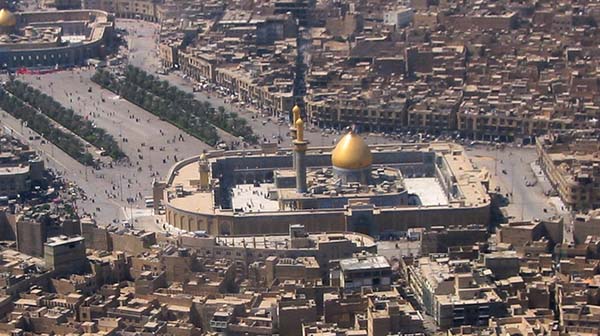The staunch hero, Imam Husain (A.S) deprecated the regime and voiced against all corruptions going on in the society. Violating moral criteria and religious beliefs filled him with strong disgust and anger. His anger was compounded when he was asked by the king, Yazid, to pledge allegiance to him and to toe the mark. He intended not to accept the humiliation by shaking hands with the cruel regime. Ultimately, Imam planned to stigmatize the illegal government of the tyrants.
The revolution of Imam Husain (A.S) was not solely for changing a government. If it was so, then it would be wrong to call it a revolution. Imam Husain (A.S) was advocating a drastic change in the social set up, the economic and political structures, and refining Islamic concepts from foreign ideas, which had crept into Muslim’s minds. In other words, Imam Husain (A.S) wanted to change the life of Muslims to be in conformity with Islamic laws and ideals. Indeed, this explains one main reason for why Imam Husain (A.S) was let down by the tribes of Kofa after being promised support, and his call was ignored by the rest of the Muslim world. Hence, a revolution means a drastic change in one’s life or the collective life when applied to a large scale.
Imam Husain (A.S) did not let outbursts of anger or pressures exerted by the unjust rulers of his time affect the direction of his movement in the least. Despite the enormity of the dangers facing him, each of his moves was well calculated and executed with an unerring precision. Indeed many within the masses, who shared in their sentiments against Yazid and his accomplices, continually tried to advise Imam Husain (A.S) to take an alternate approach. Some recommended that Husain (A.S) should seek the security of the Holy Mosque or flee to the nearby mountains of Yemen – where he would be safe from the troops of Yazid. However, Imam Husain (A.S) knew well the profane character of Yazid and more importantly, the vital need for reform within the community.
Husain (A.S) rose to restore freedom, peace, equality and justice; qualities which the Divine Message had perfected but were constantly undermined by those who hijacked religion and acted in its name. He wrote, in a will, before leaving Medina, “I have risen as I seek to reform the community of my grandfather. I wish to bid the good and forbid the evil.”
Peter J. Chelkowski, professor of Middle Eastern Studies, says, “Hussein (A.S) accepted and set out from Mecca with his family and an entourage of about seventy followers. But on the plain of Kerbela they were caught in an ambush set by the … caliph, Yazid. Though defeat was certain, Hussein (A.S) refused to pay homage to him. Surrounded by a great enemy force, Hussein (A.S) and his company existed without water for ten days in the burning desert of Kerbela. Finally Hussein (A.S), the adults and some male children of his family and his companions were cut to bits by the arrows and swords of Yazid’s army; his women and remaining children were taken as captives to Yazid in Damascus.” He also quotes the renowned historian Abu Reyhan al-Biruni as, “… then fire was set to their camp and the bodies were trampled by the hoofs of the horses; nobody in the history of the human kind has seen such atrocities.”
Imam Husain’s (A.S) revolution set a lively example as to the duty of Muslims in such conditions. It had deeply penetrated people’s hearts, and produced great pains for not doing their Islamic duty. This feeling, which pained people all the time transformed into repentance and then to an open revolt against the Umayyad’s regime. Thus, the revolution provided the stimulant to move their spirit and set it in a dynamic movement. Indeed, the Islamic movement was put to a new gear throughout the rest of the Islamic history. A series of revolutions manifesting Imam Husain’s (A.S) revolutionary spirit and reforms emerged at successive intervals. Tawabeen’s revolution took place immediately after Karbala’s tragedy. Another revolution at Madina was aiming at doing away with the Umayyads deviated regime. Al-Mukhtar Al-Thaqa filed another revolution, which stormed the Umayyad’s regime in Iraq. He was able to punish all principal collaborators in the campaign against Imam Husain (A.S) in Iraq. Mitraf ibn AI-Mughira’s revolution against Hajjaj and Abdul Malik was another result. However, there were a chain of revolutions in all parts of the Muslim world which eventually had done away with the Umayyad’s regime. Imam Husain’s (A.S) revolution was the principal slogan of the revolutionaries against the Umayyad’s.
We do remember the tragedy of Karbala but certainly forget the message thereof. Never does a new Islamic year begin without Kabul and Karachi, Dacca and Dakar, Tehran and Tripoli, every village, town and city mourning with bleeding heart the great martyr’s sacrifice of life at Karbala.
This much is no doubt our genuine love for one of the sincerest and the greatest of the nation’s heroes, the grandson of Prophet Muhammad (PBUH). But when it comes to the great martyr Husain’s (A.S) message, we have altogether forgotten. How? Let me very humbly explain it. Did Husain (A.S) try to establish a separate state to divide the Muslim Ummah, where he could rule? He did not, but we have established some sixty political divisions of the Muslim nation in the name of the so-called nation-states and we boastfully claim of being Sunnis and Shias dividing in effect the Ummah. Did the great hero of Islam accept monarchy or autocratic form of government? No, he didn’t. But we, after dividing the Muslim Ummah into nation states, have established monarchies, sultanates, emirates, military rules, and one-party dictatorships.

